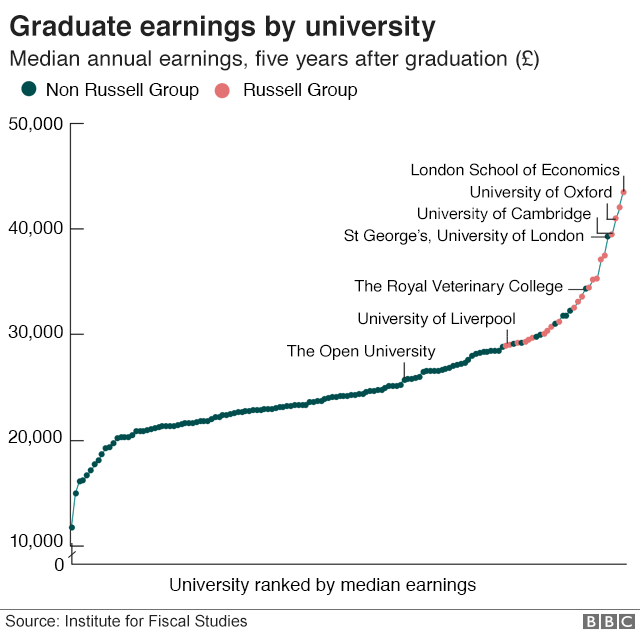Too many students left with debts for 'too little payback'
- Published

The criticism being levelled at many universities is that they are not providing value for money
Too many graduates in England are being left with big debts for too little payback, MPs are warning.
Nearly half of recent graduates were not working in graduate roles in 2017, the Commons education committee says.
Its chairman Robert Halfon also highlights the excessive pay of some university vice-chancellors, saying that is not value for money.
The government is reviewing post-18 education and funding to see how it can ensure that value.
The Augar Review, external, which is due to report early next year, is looking at the system under which students take out tuition fee loans to fund courses costing £9,000 a year.
But the committee warned that the scope of this review, which has been limited by the government, means there is a risk it "will fail to overhaul the system" in a way that will benefit graduates and students.
The government has said the review's recommendations must be consistent with the government's fiscal policies, must not affect taxation or cover the earlier pre-2012 loans system.
The report, Value for Money in Higher Education, said the committee was encouraged by an increase in information on the kind of outcomes graduates can expect.
But it warned: "The graduate premium varies greatly depending on where and what a student studies."

Mr Halfon said: "The blunt reality is that too many universities are not providing value for money, and that students are not getting good outcomes from the degrees for which so many of them rack up debt."
The report quotes a recent National Audit Office report which said bad decisions on courses could "lead to poor financial outcomes".
The MPs' committee report said: "There is still a long way to go before students have access to robust data on graduate employment which will inform their choices."
It points to Office for National Statistics data showing 49% of recent graduates were not working in graduate roles across the UK in 2017.
The report also highlighted how students from poorer backgrounds are far more likely than their wealthier peers to go to lower-ranking universities.
Here, opportunities for better-paid employment tend to be more limited.

Hard work... but for what reward?
And it recommended: "Higher education institutions must be more transparent about the labour market returns of their courses.
"This is not simply a measure of graduate earnings but of appropriate professional graduate-level and skilled employment destinations."
It should be obligatory for universities to publish this information, it said.
Mr Halfon calls for strict criteria on acceptable levels of vice-chancellor pay to be enforced.
A new voluntary code covering senior staff pay was published by universities in the summer.
Under this code, institutions must provide meaningful explanations if pay diverges from the code.
Mr Halfon said: "Too many institutions exist where vice-chancellors and senior management earn excessive amounts that does not represent value for either the student or the taxpayer.
"Self-regulation should be out of the question, and the Office for Students must enforce strict criteria on acceptable levels of pay that could be linked to average staff pay, performance and other measures."
A spokeswoman for the Department for Education said government reforms had seen "record rates" of disadvantaged 18-year-olds attending UK universities.
"That's why we are pleased to see universities and further education colleges planning to spend more than £860m on measures to improve access and outcomes for disadvantaged students," she said.

Not everyone is smiling about their student experience
"We know that what you study and where you study really matters and we are introducing and developing digital tools that provide data on graduate outcomes that will begin to revolutionise how students choose the right university for them.
"We are also reviewing post-18 education and funding, which will look at how we can ensure greater value for money for both students and taxpayers."
Disadvantaged students
Shadow education secretary Angela Rayner said universities must focus on value for money and supporting disadvantaged students.
"The Tories trebled tuition fees and scrapped maintenance grants, leaving the most disadvantaged students with over £57,000 worth of debt when they graduate," she said.
"It is no wonder there are concerns that students do not get value for money.
"The number of part-time and mature students plummeted after the Tories trebled fees, yet they are doing nothing to support the many learners who have been shut out by the current system.
"They should start by matching Labour's commitment to bring back maintenance grants, to ensure that everyone, whatever their background, can succeed at university."
Alistair Jarvis, chief executive of Universities UK, said: "Our universities have a well deserved international reputation for high quality teaching, learning and research, delivered by talented and dedicated staff.
"Universities have increased investment in teaching and learning and students continue to report record levels of satisfaction with their courses.
"Graduates leaving our universities are also increasingly in demand from employers.
"They are more likely to be in employment and earn on average £10,000 each year more than non-graduates."